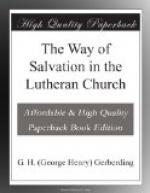We notice in the next place that there are differences in the duration of the process. With some the process lasts longer than with others. This fact is implied indeed in the variations noted above. On one person the Word may make but a superficial impression at first. It may be only a slight dissatisfaction with self. But with more light and knowledge, the feeling of penitence is deepened. Longings for something better are awakened. Yearnings and outcryings after deliverance arise from the heart. There is then only a first timid trembling look to Christ. Gradually, slowly, the faith is drawn out, until the heart is enabled to cast itself on the Saviour and rest trustingly there. It may be weeks, months, or even years, before that penitent comes out into the clear sunlight of assurance and peace. In all such cases it is “first the blade, then the ear, and then the full corn in the ear.”
On the other hand, we freely admit that there are sudden conversions. God’s word comes as a hammer or as a fire (Jer. xxiii. 29). It smites and burns until the sinner is brought low in the dust. The heart is broken and becomes contrite, and ready to lay hold of the Crucified One, as soon as He is presented. To this class, generally, belong some of those noted above as of sanguine temperament, and those who have fallen deeply into sin. Going to the Word of God for examples of the two latter classes, we might mention Zaccheus, Saul of Tarsus, the Philippian jailer, and the three thousand on the day of Pentecost, as cases of sudden conversion—while we might instance the disciples of Christ in general, as cases of slow and gradual conversion. 1 Cor. xii. 6, “There are diversities of operation, but it is the same God which worketh all in all.”
From all this it follows that not every one can tell the exact time when, and the place where, he was converted. True, some can. Zaccheus, and the jailer, and Saul, and the three thousand, would doubtless always remember and be able to tell about the time and place and circumstances of their entrance into the kingdom. But could the apostles of Jesus tell? Do we not read how slowly they were enlightened; how, little by little, their errors had to be removed, and the truth applied? They did not, in fact, become established in the faith until after the resurrection.
And so it is with many, probably, indeed, with most of the very best Christians in the church to-day. They cannot tell when they were converted.
Neither is it necessary. On the Day of Judgment the question will not be asked: “Where and when and how were you converted?” The question will be, “Were you in a converted state, turned from darkness to light, and from the power of Satan to God?” No matter whether you belonged to that favored class who kept their baptismal covenant unbroken; or whether, after you had been a stranger and a foreigner for a time, you were slowly, and through much doubt and, misgiving, brought to penitence and faith; or whether you were suddenly brought into the kingdom.




